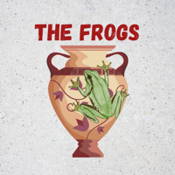
Overview
Synopsis
The Frogs is a musical based on the Ancient Greek comedy of the same name written by Aristophanes in 405 BC. The story of Dionysus’ quest to bring Euripides back from the dead has been "freely adapted" by Stephen Sondheim and Burt Shevelove, and then “even more freely adapted” by Nathan Lane in 2004.
In the musical retelling of the story, Dionysus, has lost faith in mankind as he watched the Peloponnesian War rage on and on. He decides that the only solution is to travel to Hades with his loyal servant, Xanthias, to bring back his favorite writer--George Bernard Shaw--whose writing will inspire mankind to end their foolish battle. Hilarity ensues, as Dionysos receives advice on how to man-up from his half-brother Herakles and faces his biggest fear in the River Styx...frogs! Once in Hades, Dionysos must turn a blind eye to the fine women and fine wine and complete his mission. Tensions rise as Shaw takes on William Shakespeare in a fierce battle of words, with the winner being awarded the honor of reincarnation. With a witty score, trademark Sondheim harmonies, and a ton of physical comedy, The Frogs is a rollicking musical that offers a serious message on the important role of the arts in a struggling world.
Show Information
Context
The Frogs was originally produced by Yale Repertory Theatre, while Burt Shevelove was in his senior year. The production used Yale’s swimming pool and featured Meryl Streep in the Greek Chorus. It was viewed as a critical success, but was only occasionally revived over the next twenty years. In 2004, Nathan Lane revised and expanded the script, with seven additional songs written by Sondheim. This is the production that is now commonly performed and available for licensing.
to read the context for The Frogs and to unlock other amazing theatre resources!Plot
Characters
| Name | Part Size | Gender | Vocal Part |
|---|---|---|---|
|
Lead |
Male |
Baritone, Bass-Baritone |
|
|
Supporting |
Male |
Baritone |
|
|
Supporting |
Male |
Baritone |
|
|
Supporting |
Male |
Baritone |
|
|
Supporting |
Male |
Baritone |
|
|
Supporting |
Male |
Tenor, Baritone, Bass-Baritone, Bass |
|
|
Supporting |
Male |
Baritone, Bass-Baritone |
|
|
Featured |
Female |
Alto, Mezzo-Soprano |
|
|
Ensemble |
Either Gender |
Soprano, Mezzo-Soprano, Alto, Tenor, Baritone, Bass |
Songs
Act One
- "Opening Fanfare"
- "Invocation and Instructions to the Audience" - 1st Actor, 2nd Actor, Greek Chorus
- "I Love to Travel" - Dionysos, Xanthias, Greek Chorus
- "Dress Big" - Herackles, Dionysos, Xanthias
- "I Love to Travel (reprise)" - Dionysos, Xanthias
- "All Aboard" - Charon
- "Ariadne" - Dionysos
- "The Frogs" - Dionysos, A Flash of Frogs, Fire Belly Dancing Frogs
Act Two
- "Hymn to Dionysos" - 3 Graces, Dionysians, Dionysos, Xanthias
- "Hades" - Pluto and the Hellraisers
- "It's Only a Play" - Greek Chorus
- "Shaw" - Dionysus, Shaw, Shavians
- "Fear No More" (Lyrics from Act IV, Scene 2 of Shakespeare's Cymbeline.)
- "All Aboard (reprise)" - Charon
- "Hymn to Dionysos (reprise)" - Greek Chorus
- "Final Instructions to the Audience" - Dionysos and Company
A song with an asterisk (*) before the title indicates a dance number; a character listed in a song with an asterisk (*) by the character's name indicates that the character exclusively serves as a dancer in this song, which is sung by other characters.
Monologues
Scenes
Key Terms
Sorry! We do not currently have terms for this guide.
Videos
Quizzes
Themes, Symbols & Motifs
Sorry! We do not currently have learning modules for this guide.
Quote Analysis
Sorry! We do not currently have learning modules for this guide.
